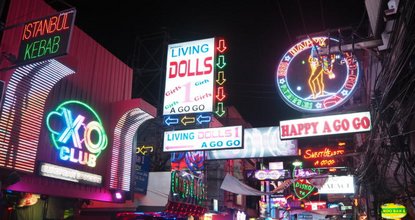
They sell their bodies to rescue their families from poverty. Now they are arrested and face imprisonment to rescue Thailand from being branded one of the world's worst human trafficking offenders.
I am talking about the many poor, young girls from neighbouring countries who sought greener pastures, ended up in sex work, and are now wilting in prisons and prison-like rehabilitation centres as police step up their crackdown to improve Thailand's anti-human trafficking record.
It takes two to tango. How come only sex workers get arrested and not the customers too?
The brothel operators and procurers are actually the main targets in the prostitution law, yet they remain free. Why?
Why punish only the ones at the lowest rung of the flesh-trade food chain?
What right have police to herd frightened girls like cattle into the flashlights of crime photographers, forcing them to cover their faces in shame? All this so police can score credit from senior colleagues?
Parading suspects to be photographed by the media is a gross violation of human rights. Yet it is a routine practice of the police force.
In the past few weeks, raid photos with young women trying to hide their faces from prying photographers have appeared frequently on the pages of newspapers. Apparently, the government is trying to send a message to the US and Europe that it is getting tough on human trafficking.
Will it work? To escape trade sanctions, Thailand must show it is after the big guys in organised transnational human trafficking crimes. Where are they? The bosses, the brokers, the procurers?
Also, the prostitution law — after the amendment in 1996 — has already revoked the imprisonment of sex workers. They are now only fined 1,000 baht if they are engaged in loitering. So why are they being arrested now?
"Many of the girls are actually arrested as procurers," said Naiyaya Supapueng, an advocate of gender equality and a former human rights commissioner.
According to her interviews with many of the sex workers, police officers pretend they are customers and ask the older workers to make recommendations and bring them the girls. Then they are arrested.
Other girls were arrested for being found in venues where prostitution occurred, and fined. Since many of them are teenagers, they were sent to rehabilitation centres. Given the rigid routines, confinement and lack of freedom at the centres, many have tried to flee and return to traffickers' open arms.
Ms Naiyana was among campaigners seeking the new prostitution law. "We thought the new law would help sex workers and bring gender equality to the issue. If sex workers are punished for selling sex, then the customers must be punished too.
"The law also focuses on people who exploit sex workers. But it doesn't work out that way. The cultural values that seek to punish 'bad girls' are simply too deep and too powerful in our society."
The belief that bad girls deserve punishment neutralised calls for the total decriminalisation of sex work when the prostitution law was amended two decades ago, said Ms Naiyana.
"People still wanted to leave room for arrests, fines and forced rehabilitation. They believed many girls would rush to become prostitutes if there was no punishment at all," she recalled. "They won."
Although Thailand has anti-human trafficking laws to help victims, Ms Naiyana said they often do not get help if they work in the sex industry.
A lawyer by training, she still believes a new law that treats sex work as employment could significantly reduce abuse and exploitation.
"If they feel confident that they won't be arrested, they'll have more bargaining power to choose their employers and workplaces. Now, they feel they're only safe if they work for operators who can protect them from the police," she said.
Not all her feminist friends agree. For them, prostitution should not be condoned because it perpetuates the cultural belief that women are sex objects.
As for me, I have no dilemma. Sleeping with strangers and risking abuse should be women's last resort. Society must do everything it can to equip women with the necessary tools to realise their full potential. If it fails to do that, it has no right to pass judgement if they are forced by life circumstances to choose sex work to support themselves and families, nor to punish them.
If society still demonises prostitution, women cannot be singled out. If that is not possible, then leave them alone.
Sanitsuda Ekachai is editorial pages editor, Bangkok Post.
